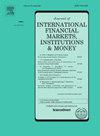股权流动的因果效应:来自韩国的证据
IF 6.1
2区 经济学
Q1 BUSINESS, FINANCE
Journal of International Financial Markets Institutions & Money
Pub Date : 2025-05-31
DOI:10.1016/j.intfin.2025.102175
引用次数: 0
摘要
在本文中,我们使用基于韩国股票市场外国投资监管数据构建的颗粒工具变量(GIV)来估计总股本流入开放经济的因果效应。我们发现,每月流入韩国股市的外国资金增加一个标准差,导致韩国基准股价指数上涨约2.2%,韩元兑美元升值1.0%。这些外国资金流入还导致短期国债利率下降,美元融资条件改善。我们的实证结果与非弹性市场假说一致。本文章由计算机程序翻译,如有差异,请以英文原文为准。
The causal effects of equity flows: Evidence from Korea
In this paper, we estimate the causal effects of gross equity inflows into an open economy using the Granular Instrument Variable (GIV) constructed from regulatory data on foreign investments in the Korean stock market. We find that a one-standard-deviation increase in monthly foreign inflows into the Korean stock market results in approximately a 2.2% rise in the Korean benchmark stock price index and a 1.0% appreciation of the Korean won against the US dollar. These foreign inflows also lead to drops in short-term treasury bond rates and improvements in dollar funding conditions. Our empirical results are consistent with the Inelastic Market Hypothesis.
求助全文
通过发布文献求助,成功后即可免费获取论文全文。
去求助
来源期刊
CiteScore
6.60
自引率
10.00%
发文量
142
期刊介绍:
International trade, financing and investments, and the related cash and credit transactions, have grown at an extremely rapid pace in recent years. The international monetary system has continued to evolve to accommodate the need for foreign-currency denominated transactions and in the process has provided opportunities for its ongoing observation and study. The purpose of the Journal of International Financial Markets, Institutions & Money is to publish rigorous, original articles dealing with the international aspects of financial markets, institutions and money. Theoretical/conceptual and empirical papers providing meaningful insights into the subject areas will be considered. The following topic areas, although not exhaustive, are representative of the coverage in this Journal. • International financial markets • International securities markets • Foreign exchange markets • Eurocurrency markets • International syndications • Term structures of Eurocurrency rates • Determination of exchange rates • Information, speculation and parity • Forward rates and swaps • International payment mechanisms • International commercial banking; • International investment banking • Central bank intervention • International monetary systems • Balance of payments.

 求助内容:
求助内容: 应助结果提醒方式:
应助结果提醒方式:


